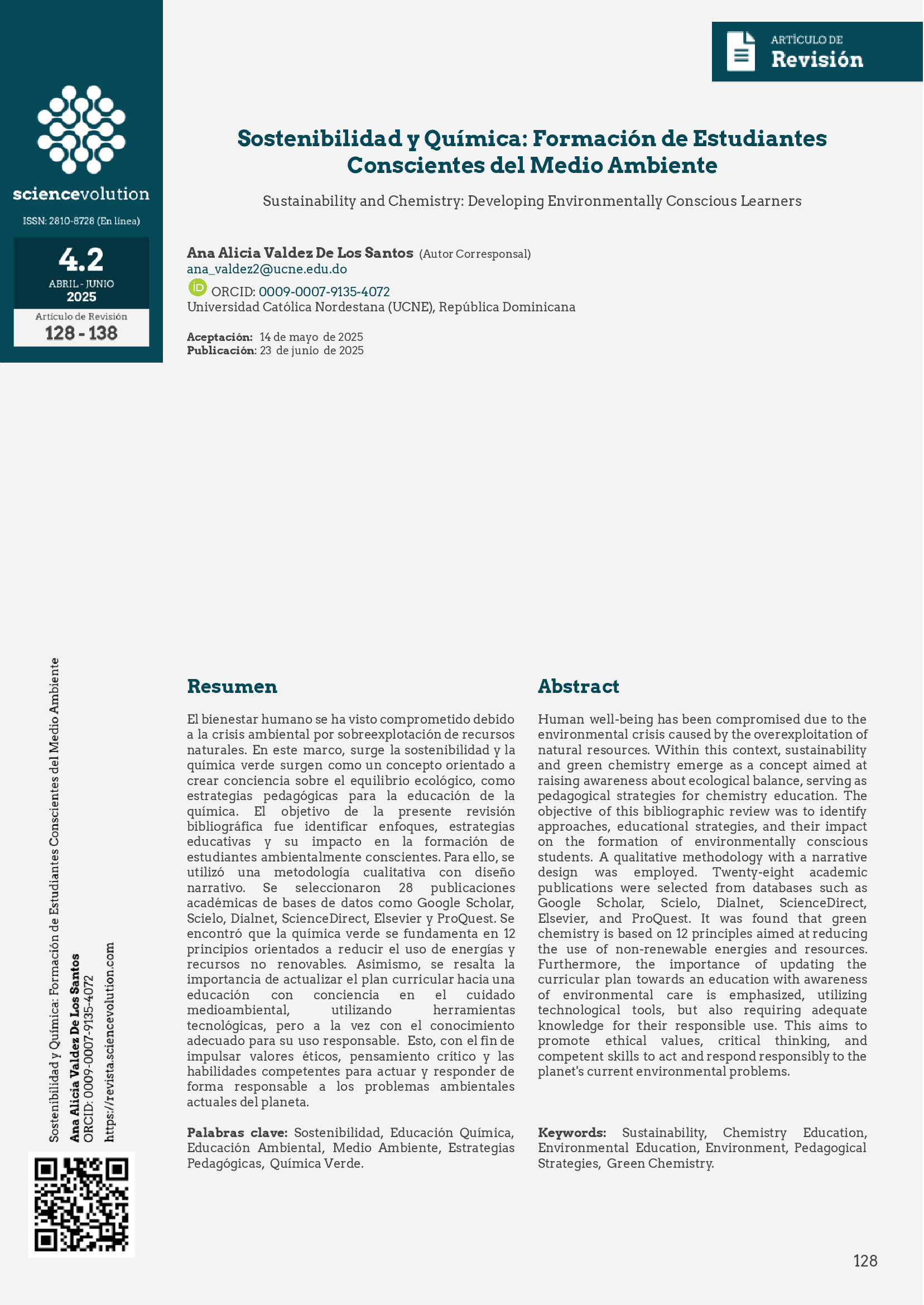Abstract
Human well-being has been compromised due to the environmental crisis caused by the overexploitation of natural resources. Within this context, sustainability and green chemistry emerge as a concept aimed at raising awareness about ecological balance, serving as pedagogical strategies for chemistry education. The objective of this bibliographic review was to identify approaches, educational strategies, and their impact on the formation of environmentally conscious students. A qualitative methodology with a narrative design was employed. Twenty-eight academic publications were selected from databases such as Google Scholar, Scielo, Dialnet, ScienceDirect, Elsevier, and ProQuest. It was found that green chemistry is based on 12 principles aimed at reducing the use of non-renewable energies and resources. Furthermore, the importance of updating the curricular plan towards an education with awareness of environmental care is emphasized, utilizing technological tools, but also requiring adequate knowledge for their responsible use. This aims to promote ethical values, critical thinking, and competent skills to act and respond responsibly to the planet's current environmental problems.
References
Anastas, P. T., & Warner, J. C. (1998). Green chemistry: Theory and practice. Oxford University Press.
Amoneit, M., Weckowska, D., Spahr, S., Wagner, O., Adeli, M., Mai, I., & Haag, R. (2024). Green chemistry and responsible Research and innovation: moving beyond the 12 principles. Journal of Cleaner Production, 484, 144011. https://doi.org/10.1016/j.jclepro.2024.144011
Araripe, E., & Zeidler, V. G. Z. (2024). Advancing sustainable chemistry education: Insights from real-world case studies. Current Research in Green and Sustainable Chemistry, 9, 100436. https://doi.org/10.1016/j.crgsc.2024.100436
Araújo, L. R., Simões Neto, J. E., Tenório da Silva, J. R. R., & Leite, B. S. (2024). Digital technologies in chemistry teaching in the journal Chemistry Education Research and Practice: An analysis through a systematic literary review [PDF]. Latin American Journal of Science Education, 11, 12001. https://www.lajse.org/may24/2024_12001.pdf
Ballesteros-Ballesteros, V., & Gallego-Torres, A. P. (2022). De la alfabetización científica a la comprensión pública de la ciencia. Trilogía Ciencia Tecnología Sociedad, 14(26), e1855. https://doi.org/10.22430/21457778.1855
Barreto-De Corona, L. A., Medina-Peralta, M., & Polanco, S. (2024). Uso de las redes sociales como recurso didáctico para la enseñanza de química en 5to de secundaria, República Dominicana. Congreso Caribeño De Investigación Educativa, 4, 103–108. https://congresos.isfodosu.edu.do/index.php/ccie/article/view/1173
Chen, M., Jeronen, E., & Wang, A. (2020). What lies behind teaching and learning green chemistry to promote sustainability education? A literature review. International Journal of Environmental Research and Public Health, 17(21), 7876. https://doi.org/10.3390/ijerph17217876
Chiu, W. (2021). Pedagogy of emerging technologies in chemical education during the era of digitalization and artificial intelligence: a systematic review. Education Sciences, 11(11), 709. https://doi.org/10.3390/educsci11110709
Doddapanen, N., Lakshmegowda, Y. K., Aardhya, S., Rajashekar, R., Doolgindachbaporn, T., & Nagaraju, P. (2024). Environmental education, awareness and environmental ethics among pre-university students of Mysuru city, Karnataka, India. World Journal of Environmental Biosciences, 13(2), 13-20. https://doi.org/10.51847/nBbI6XJU0H
Etzkorn, F. A., & Ferguson, J. L. (2022). Integrating Green Chemistry into Chemistry Education. Angewandte Chemie International Edition, 62(2). https://doi.org/10.1002/anie.202209768
Fernández Mora, V., García Moro, F., & Gadea, W. (2021). Universidad y sostenibilidad. Límites y posibilidades de cambio social. Revista De La Educación Superior, 50(199), 1-26. https://www.scielo.org.mx/scielo.php?pid=S0185-27602021000300001&script=sci_abstract
Franco Moreno, R. A., Reina Hernández , J. A., & Riveros Toro, C. M. (2020). Concepciones sobre química verde en profesores de química en formación inicial. Noria Investigación Educativa, 1(5), 94–108. https://revistas.udistrital.edu.co/index.php/NoriaIE/article/view/16507
Hernández-Sampieri, R., & Mendoza, C. (2018). Metodología de la investigación: Las rutas cuantitativa, cualitativa y mixta. McGraw-Hill Education. https://doi.org/10.22201/fesc.20072236e.2019.10.18.6
Herranen, J., Yavuzkaya, M., & Sjöström, J. (2021). Embedding chemistry education into environmental and sustainability education: development of a didaktik model based on an eco-reflexive approach. Sustainability, 13(4), 1746. https://doi.org/10.3390/su13041746
Jackson, A., & Hurst, G. A. (2021). Faculty perspectives regarding the integration of systems thinking into chemistry education. Chemistry Education Research and Practice, 22(4), 855–865. https://doi.org/10.1039/d1rp00078k
Kurul, F., Doruk, B., & Topkaya, S. N. (2025). Principles of green chemistry: Building a sustainable future. Discover Chemistry, 2(68). https://doi.org/10.1007/s44371-025-00152-9
Manapova, S., Shaikhova, B., Kumarbekuly, S., Mikushina, I., & Afanasenkova, I. (2025). A set of online tools for teaching chemistry considering a systematic approach to the educational process. International Journal of Innovative Research and Scientific Studies, 8(1), 1363–1379. https://doi.org/10.53894/ijirss.v8i1.4613
Mendoza Ramos, H. J., Zambrano, B. A., & Góngora Cheme, R. (2025). Aplicación de la química verde en la educación y la reducción de contaminantes industriales: Un enfoque educativo sostenible. Revista Generando, 6(1), 4921–4936. https://doi.org/10.60100/rcmg.v6i1.632
Naciones Unidas. (s. f.). Objetivo 4: Garantizar una educación inclusiva, equitativa y de calidad y promover oportunidades de aprendizaje durante toda la vida para todos. Naciones Unidas. Recuperado el 22 de abril de 2025, de https://www.un.org/sustainabledevelopment/es/education/
Organización de las Naciones Unidas para la Educación, la Ciencia y la Cultura. (s.f.). Education for sustainable development. UNESCO. Recuperado el 17 de abril de 2025, de https://www.unesco.org/en/sustainable-development/education
Organización de las Naciones Unidas para la Educación, la Ciencia y la Cultura. (2022). Aprender por el planeta: Revisión mundial de cómo los temas relacionados con el medio ambiente están integrados en la educación. UNESCO. https://unesdoc.unesco.org/ark:/48223/pf0000380480
Organización de las Naciones Unidas para la Educación, la Ciencia y la Cultura (UNESCO). (2020). Educación para el desarrollo sostenible: Hoja de ruta. UNESCO. https://unesdoc.unesco.org/ark:/48223/pf0000374896
Organización para la Cooperación y el Desarrollo Económicos. (2023). Education Policy Outlook 2023: Empowering all learners to go green. OECD Publishing. https://doi.org/10.1787/f5063653-en
Pino, A. L. (2024). Evaluación de una metodología de enseñanza‑aprendizaje en química verde. Educación Química, 35(3). https://doi.org/10.22201/fq.18708404e.2024.3.87434
Programa de las Naciones Unidas para el Medio Ambiente. (2024). Specialized manual on green and sustainable chemistry education and learning. https://www.unep.org/resources/report/specialized-manual-green-and-sustainable-chemistry-education-and-learning
Van Cauwenberghe, C. (2024). The vital role of sustainable chemistry. Open Access Government, 390–391. https://www.openaccessgovernment.org/article/the-vital-role-of-sustainable-chemistry/182467/
Widyantoro, C., Han, J. Y., Ong, J. S. H., Goh, K. H., & Fung, F. M. (2025). Teaching sustainability through green chemistry: An experiential learning approach. Journal of Chemical Education. https://doi.org/10.1021/acs.jchemed.4c01476
Yánez Romero, M. (2024). Integración efectiva de las TIC en la enseñanza de química: Estrategias innovadoras para la docencia universitaria. Revista Social Fronteriza, 4(2), e181. https://doi.org/10.59814/resofro.2024.4(2)181
Zuin, V. G., Eilks, I., Elschami, M., & Kümmerer, K. (2021). Education in green chemistry and in sustainable chemistry: Perspectives towards sustainability. Green Chemistry, 23, 1594–1608. https://doi.org/10.1039/D0GC03313H

This work is licensed under a Creative Commons Attribution-NonCommercial-NoDerivatives 4.0 International License.

